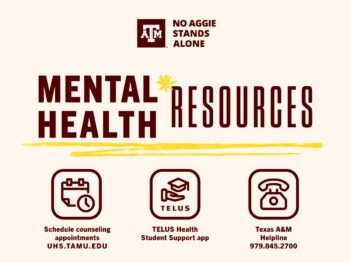When It Comes To Mental Health, The First Step Is The Most Important

Like most college students, junior Julian Harrison knows what it’s like to not feel OK.
As president of Aggie Mental Health Ambassadors, he talks openly and often with peers about his own mental health journey, having frank conversations about the stress, isolation and depression that so many college students likely will experience at some point in their academic journey.
“When I first transitioned to college, I was struggling to be sure, and so mental health was something I started to really pay attention to,” Harrison said. “That’s what drew me to Aggie Mental Health Ambassadors,” a student organization that works to educate peers about the importance of mental health and connect them with relevant resources, including those available through University Health Services.
“Mental health is part of our overall wellbeing,” said Dr. Michelle Bettin, senior director of counseling and mental health care at University Health Services and licensed clinical psychologist. “It’s important because it has so many impacts on how we function — how we learn, how we relate, how we manage stress, how we make decisions.”
With that in mind, Bettin says students should know that no matter what they’re experiencing, University Health Services is here to help — whether you’re seeking treatment for anxiety or depression, or you’ve had a stressful week and just need to talk to someone.

Taking charge of your mental health can feel daunting, but Bettin says it doesn’t have to be, especially with the many confidential resources available at Texas A&M. The university is currently working to boost awareness of these resources through a campus-wide mental health campaign, No Aggie Stands Alone.
“The most important thing is just to do something — start somewhere,” Bettin said. “There are lots of ways to get that process started, so don’t wait.”
Take The First Step
Download the Student Support App
For students who would like help with their mental health but don’t have time for in-person counseling, one of the newest and most flexible resources available through University Health Services is the TELUS Health Student Support app.
The app can be installed and set up in just a few short steps and allows students to connect with a professional counselor any time they want, says University Health Services Assistant Director Kristie De La Garza, licensed professional counselor-supervisor.
“This is a free, 24/7 counseling opportunity for our Aggie community,” De La Garza said. “Just by picking up their phone and using the app, they can chat with a mental health care provider, whether it’s 2 in the morning or 2 in the afternoon. They can reach out during a time of distress or if they’re having some questions about how to take care of themselves.”
Through the app, Aggies can talk to a counselor via text chat or phone call, with services available in multiple languages including Spanish, French, Mandarin and Cantonese. Other languages may be available by request. Students can even schedule a limited number of repeat sessions with the same counselor if needed.
“These are real people — vetted mental health providers — who go through specific training for telehealth,” De La Garza said. “Many times, using this app is the first time a student took a step to ask for help, and I think that’s really important.”
Other features include an educational media library covering a variety of mental health-related topics, anonymous assessments for conditions like depression, anxiety and drug use, and even access to guided meditations and fitness sessions.
No matter how you choose the use the app, De La Garza says it’s crucial to sit down and think about what you hope to gain from your experience.
“Sometimes students just call and hope to be fixed. But they’re not broken,” she said. “They just have to be able to advocate for what they need.”
Talk to a University Health Services counselor
When most people think about counseling, they have a particular image in mind. But as Bettin explains, counseling can actually look very different depending on an individual student’s needs and goals.
Options at University Health Services include individual counseling, group therapy sessions designed to foster support and connection between peers, and one-time, 25-minute appointments called Quick Checks.
University Health Services also conducts on-campus workshops and other outreach programs, including Let’s Talk, where students can drop in and chat with a mental health professional in a safe and familiar setting.
“We always recommend the different workshops and support groups that UHS provides,” Harrison said. “I’ve done one in the past about self-esteem, and that really helped me because it makes you realize you’re not alone when you’re suffering from a certain issue.”
Students can visit uhs.tamu.edu to schedule counseling appointments or to learn more about resources and programming.
For students requiring same-day support, crisis counseling offers walk-in availability, allowing students to speak with a crisis counselor to when facing urgent mental health challenges, such as thoughts of suicide or self-harm. Please note, students should call 911 or visit their nearest emergency room if currently experiencing a life-threatening situation or if their safety is at risk. Call 988 to reach the National Suicide Prevention Lifeline.
While it might be hard to take a break from your studies to work on your mental health, Bettin says it’s always well worth it in the long run — for yourself and for those around you.
“It can be hard to acknowledge that taking that time can actually make you perform better,” Bettin said. “I think we do well by our community by taking care of ourselves in those ways and making sure that we’re our best selves.”
Call HelpLine
Students in need of mental health support outside of regular business hours can connect with a dedicated peer volunteer by calling the UHS HelpLine. Just dial 979-845-2700 between the hours of 4 p.m. and 8 a.m. on weekdays or any time during the weekend when classes are in session. A fellow Aggie will be standing by to take your call.
“Students might just need to talk someone, and that’s a way they can do that,” Bettin said, noting that students often find it easier to talk with a peer than with a total stranger. “There are many students who would rather talk to someone who really understands their local context and is connected as part of their community.”
That’s why student involvement in HelpLine and organizations like Aggie Mental Health Ambassadors is so crucial, Bettin said: “When we have those connections, we’re better informed about what students need and how we can continue to improve to meet their needs.”
At a campus as large as Texas A&M, it can be easy to feel lost in the crowd, Harrison said. But as long as students take the time to be honest and supportive with each other, no Aggie should have to face these challenges alone.
“When someone asks how you’re doing, you don’t necessarily have to respond with ‘I’m doing pretty good,’” Harrison said. “You can actually do a little reflection, and if you’re ready, be vulnerable with that person and talk about how you’re really feeling. That is the kind of environment that we want to foster when we talk about mental health.”
Media contact: Luke Henkhaus, henkhaus@tamu.edu





